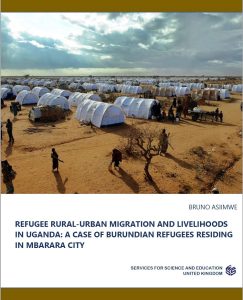Refugee Rural-Urban Migration and Livelihoods in Uganda: A Case of Burundian Refugees Residing in Mbarara City
Bruno Asiimwe
- Keywords:
- Refugees, Rural-Urban Migration, Livelihoods and Humanitarian Assistance
- Abstract:
- The study investigated the environment surrounding refugees’ access to humanitarian assistance which tends to suffocate the spirit of the Uganda Refugee Act of 2006 under Article 30 which allows freedom of movement for refugees in the country. The contradiction is set in the same refugee policy by asking refugees living outside the settlement areas to gather their own support as regards humanitarian assistance. The main objective of the study was to examine the rural-urban migration of Burundian refugees residing in Mbarara city with the origin of Nakivale Refugee Settlement. Specific objectives were also formulated to reflect a simplified understanding of the broader meaning of the main objective. They included; identifying the push and pull factors of Burundian refugees migrating from Nakivale Refugee Settlement to urban areas, examining the challenges faced by Burundian refugees residing in urban areas and identifying the livelihood strategies of Burundian refugees residing in urban areas. For these objectives to be achieved a qualitative means of inquiry was used and data collection was done with the aid of semi-structured interviews, Key informant interviews and the observation method to take notice of some of the refugee livelihoods. The sample size of the study was twenty eight (28) respondents who were selected using snowball and purposive sampling techniques for the mentioned interview guides respectively. With the help of Atlas ti, the analysis of qualitative data was done for the respondents in Mbarara city and Nakivale Refugee Settlement. The analysis shows specific points of origin of Burundian refugees largely residing in urban areas to have had a close relationship with their current choice of destination for migration. It was noted that many reasons for refugee rural-urban migration hinge on the lifestyle they missed on arrival at Nakivale Refugee Settlement. Importantly, refugees are challenged with access to food rations that was worsened with the presence of corona virus lockdown restrictions; insecurity, unemployment and the socio-cultural nature of life. Amidst this environment, specific livelihood strategies have been noted especially in regard to accessing food assistance. The unnecessary conditions tied to access of food rations by requiring refugees to make a quarterly mandatory return journey to Nakivale Refugee Settlement demean the decision taken by these refugees to migrate to urban areas. There is need to adopt a different direction for monitoring refugees without infringing on their rights to movement and seeking gainful employment.

Published
- November 18, 2022
Categories
Copyright
- Copyright (c) 2022 Bruno Asiimwe
License
This work is licensed under a Creative Commons Attribution 4.0 International License.